The ultimate guide to Facebook's ad interest targeting.

Recently facebookjiaocheng.com.
A new article has been published.
Let's take a look.

(The following is.)facebookjiaocheng.comOriginal)
For the marketing of new customers, interest positioning has always been a piece that can not be ignored. But how do you find the precise interest audience for your product? What are the methods of positioning research? How do I find interesting words? Come on, all you want to know is here.
This article will be divided into two parts, the first of which will cover interest-based targeting and will detail how to spend less money to achieve better results while reaching potential audiences more accurately than competitors. In the second part, you'll be instructed on how to use existing data to boost Facebook ads.
Directory.
The first part.
1. Interest-based positioning.
2. What if Facebook users don't want to see your ads?
3. What exactly are we looking for when we're looking for interesting words?
4. Buyer user portrait.
5. 16 ways to find words of interest.
#1 Audience Analytics - Sort by Like.
#2 Google Search.
#3 track your existing customers and see what pages they like or like.
Page recommendations and page likes.
#6 the recommended options in your ad group settings.
#7 create a Google campaign to see which sites visitors come from.
#8 use the Socail Bakers website.
#9 use Facebook Gragh for inspiration.
#10 search for posts on Facebook.
#11 search for Facebook posts on Google.
#12 use Wikipedia.
#13 browse products on Amazon and IMDB.
#14 Similarweb和Similarsites
#15. Google Display Planner
#16 the "Why do I see this content" option.
Summary.
The second part.
1. 5 ways to target your audience.
#1 a wide range of words of interest.
#2 home page.
#3 layered keywords.
#4 group targeting.
#5 use the Exclude Users option.
2. How big should the audience be?
3. How do I tell the difference between an interest association word and a home page word?
#1 compare audience size and Page fans in Audience Analytics.
#2 pure words of interest (lowercase letters)
#3 official figures.
#4 looks like a Wikipedia home page.
#5 audience analysis.
The first part.
1 Interest-based positioning.
Interest targeting is typically used for new traffic, like introducing yourself to strangers, and Facebook can provide strong support for it. Imagine how much effort it would take to identify potential customers from so many cluttered sites without Facebook! First, you have to find out which sites all the potential customers might visit, and then you have to look at each site to decide whether it's suitable for promotion. Only then can you begin to figure out how to self-promote, either advertising or writing soft text, provided you are authorized to consent to these sites.
Now because of Facebook, you just need to know how to advertise on a website, and it feels like power is in your hands.
2 What if Facebook users don't want to see your ads?
When you search for Google, you have intent. You know what you're looking for - you have an intention to find an answer. On Facebook, people learn about their friends, receive input, and are inspired by new things, but they don't know what's coming next. Sure, they have no interest in your ads.
What do we do? One way to do this is to find their points of interest and the information buried in their accounts. The key to interest targeting is that you can talk to an audience you know.
Tip: Facebook isn't happy for you to shout rudely to target your audience, but when you're skillfully laid out, the audience is interested.
For example, you want to target Alipay's audience, rather than writing "Alipay public number is not a small editor?" ", it's better to use the audience's words" two dogs are not fired by the horse father? "It takes a certain amount of audience analysis, and it's well worth it.
Like Google, Facebook has a number of specific keywords, but facebook's keywords are embedded in a user's account, allowing it to match advertisers' interest. These keywords are based on an analysis of the user's behavior, such as which pages are liked and many other variables. Here's how to find and use these words of interest, but first look at the following illustration: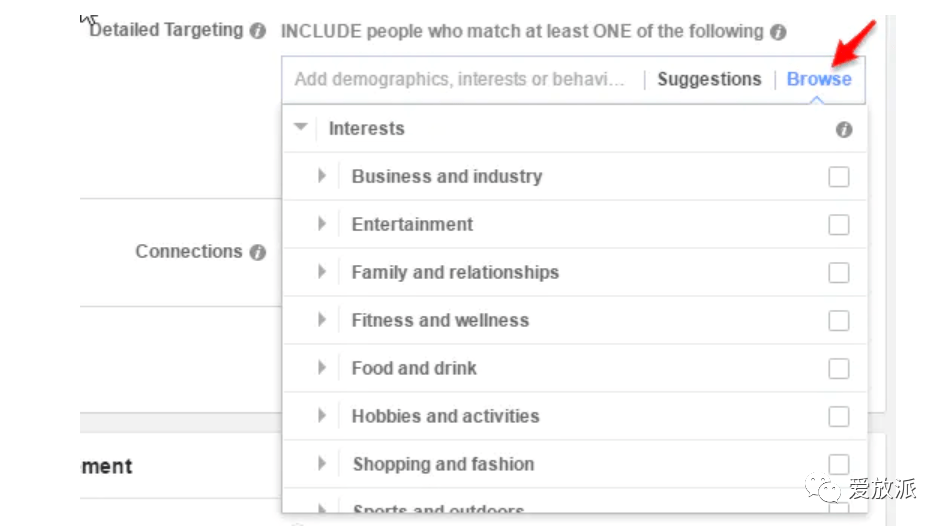
As you may have noticed when you created your ad group, you can select specific interest words for behavior and demographic targeting in the illustration drop-down menu. But these words of interest are usually broad words that don't work easily, and I'll tell you why.
When you open the Facebook Ad Preferences page, you can see a preview of Facebook's interests. Do you think they're accurate? At least for me it doesn't actually fit my point of interest. Here's a screenshot of my Facebook ad preferences, the red box shows that I'm not really interested, and Facebook misjudged it.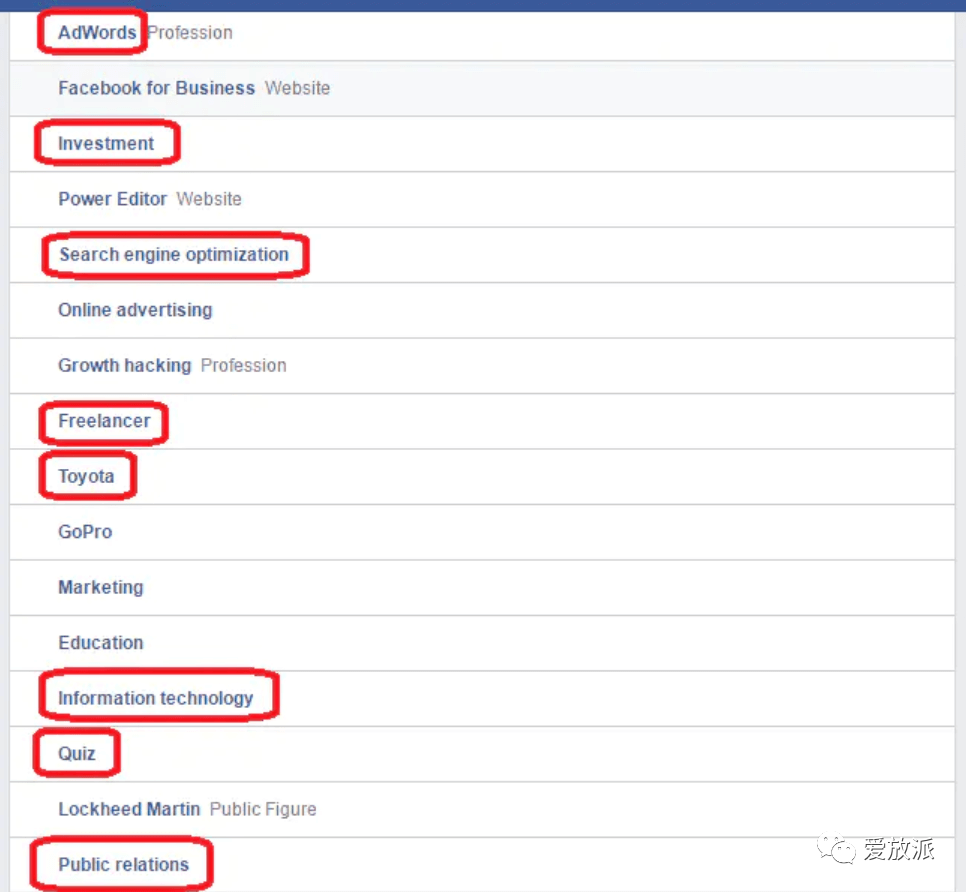
But some of the words of interest are right.
Because I'm interested in Facebok ads, am I interested in online ads? If you use these two keywords to target me, it is too wasteful, imagine how many irrelevant audience will also be targeted ah. That's why I rarely use a wide range of words of interest. Although Facebook regularly updates and improves its advertising system, there has been no improvement in this regard.
In other words, keywords are a mixture of home pages, popular words, and so on.
This mix is like a big bag full of anything from thrillers to surprises, which can generally be divided into two categories: home keywords and other keywords. My personal experience is that other keywords are far less effective than home keywords, unless you stack up a lot of other keywords. If there is not a specific home page behind a keyword, it is likely to be just an "interest associated word". When your account doesn't have likes, Facebook uses interest associations to refer to you. More precisely, it's Facebook's algorithm that defines you based on other behaviors, such as posting comments to friends, participating in a topic on Facebook Messenger or in other forms.
Ideally, I would look for a large/medium V home page around a topic. Using only one Page Interest Word (plus relevant demographics) in an ad group allows me to focus on my audience, and all I have to do is survey the Page. I'll find out what topics these audiences are interested in and how they speak so I can find a way to get a paper start.
The problem is that some pages can't be located for an unknown reason, but Facebook has told Amay Porterfield that they're not being taken in (and I don't know what that means). So if an interest word is not a home page, it may be an interest association word or a popular word.
And the principle of these "association words" or buzzwords is that if a topic suddenly catches attention, Facebook automatically crawls the wiki to explain and generate a related information page, like this: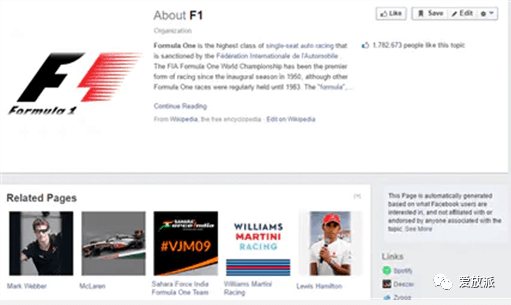
Later in this article, we'll show you how to identify the home page and common interest words, but first let's take a look at some of the survey considerations.
3 What exactly are we looking for when we're looking for words of interest?
The essence of targeting is to find people who are really interested in your product, not ordinary netizens who are interested in a big topic and just want to swipe related posts. We need to find people who think about specific topics and are actively engaged, who are true love powders, who are interested in many things and know a lot more than pseudo-powders.
Digital marketing experts describe this as the "others don't know" theory, which is to find people who know what others don't know on a topic.
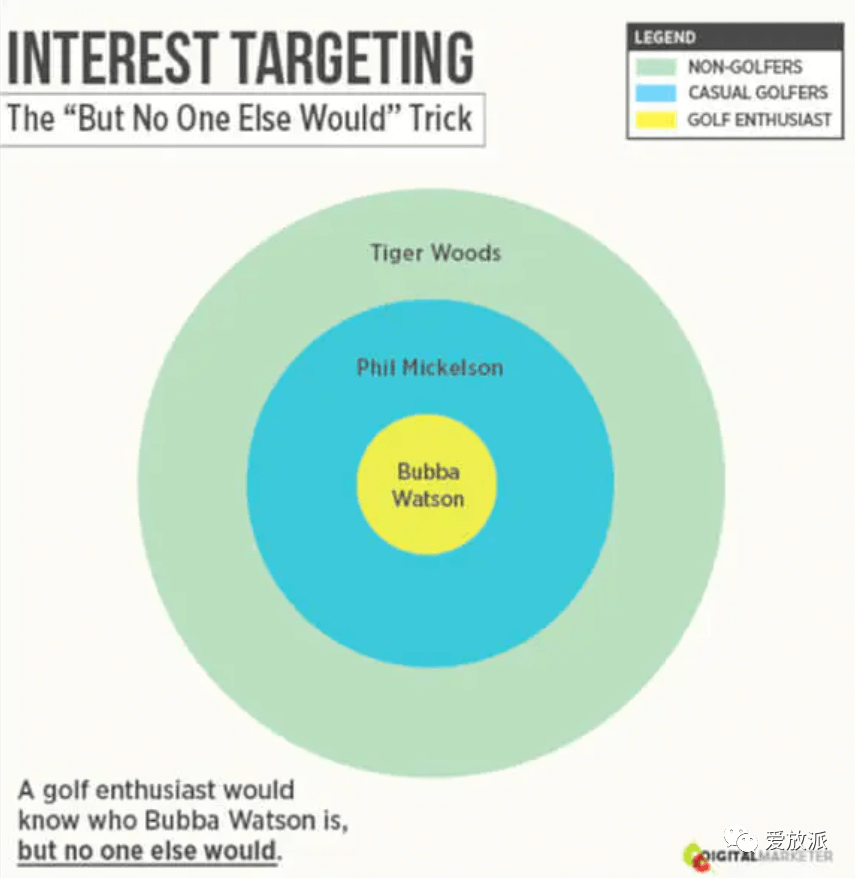
A common example of them is Tiger Woods, a famous golfer who comes to his home page for a variety of reasons. At the same time, a golf enthusiast will know who Bubba Watson is, but others don't. So if you're targeting public figures, events, or magazines, the theory will come in use. You can target audiences who like both Tiger Woods and Bubba Watson, so you can grab the golf powder from Tiger Woods fans.
4 Buyer user portrait.
Before you do a location survey, it is necessary to understand the buyer's user portrait.
Neil Patel once said: "Buyer user portraits are a semi-fictional character based on market research and data analysis of existing buyers. To do a good job of painting buyers, he suggests answering these three questions:
- What is the buyer's demographic information?
- What is a typical day in a buyer's life?
- What are the buyer's pain points?
For more explanations, check out his article.
Well, it's time to focus: How do I find a targeting interest word? Doing this well will help you break through the market.
5 16 ways to find words of interest.
When I do a location survey, I usually go through the following 16 methods first. When I find a relevant keyword, I go to find out if I can locate it, yes, write it down. It's as simple as that.
How to find out if the keyword can be located out - open the audience analysis section, the keywords into the look, if the pop-up can be used, if not unavailable.
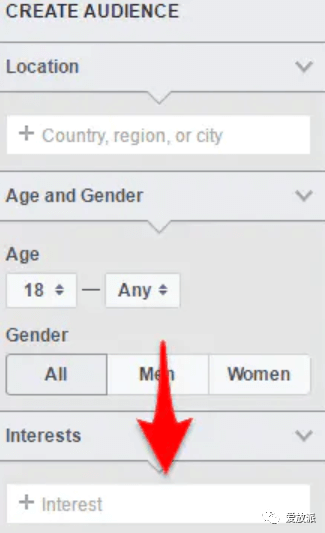
Note: I'll also share later how to evaluate the location survey results, don't miss out.
#1 Audience Analytics - Sort by Like.
Many Facebook advertising marketing courses use this as a selling point, the so-called targeting secret. In fact, this is a basic tool that everyone can use - easy to operate, powerful data, free to use! It only takes a little effort to get a cost-effective result. The only drawback is that your competitors will use it, too.
Here's how:
Step 1: Open the Audience Analysis section and enter an interest word and country.
Step 2: Click Home Like.
Step 3: Pull down to the bottom right and click Affinity.
Likeability is the extent to which the interested audience you're targeting is more likely to be interested in a particular Page than other people on Facebook. As shown in the figure below, I entered the word "Formula One" interest. Compared to other Facebook users, 3.4x users who like the F1 homepage may be interested in Formula One.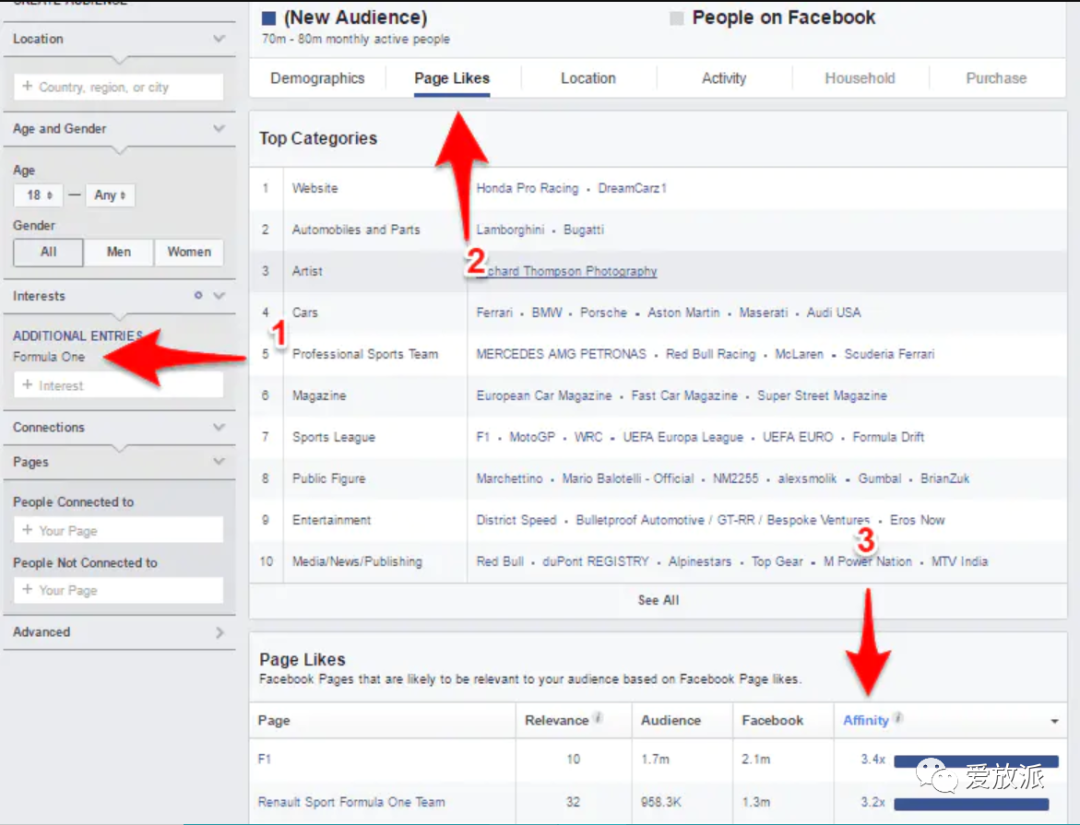
#2 Google Search.
You can also do searches outside of Facebook, which I personally search for using Google:
- Associations
- Brands/Products
- Magazines/Blogs
- Websites/Webshops
- Public Figures
Just google for the above categories and your industry domain words. Then search Facebook for the page, or search for the URL to see if there's an associated page, and finally check to see if any words of interest are available.
#3 track your existing customers and see what pages they like or like.
If someone has had a lot of interaction with your Page or brand, you can check to see if there's any public interest or likes on these people's profiles (they're likely to have a lot of interaction with competitors or other Pages as well).
The action is to open your profile, find their likes section, and see if there's anything relevant to your targeting.
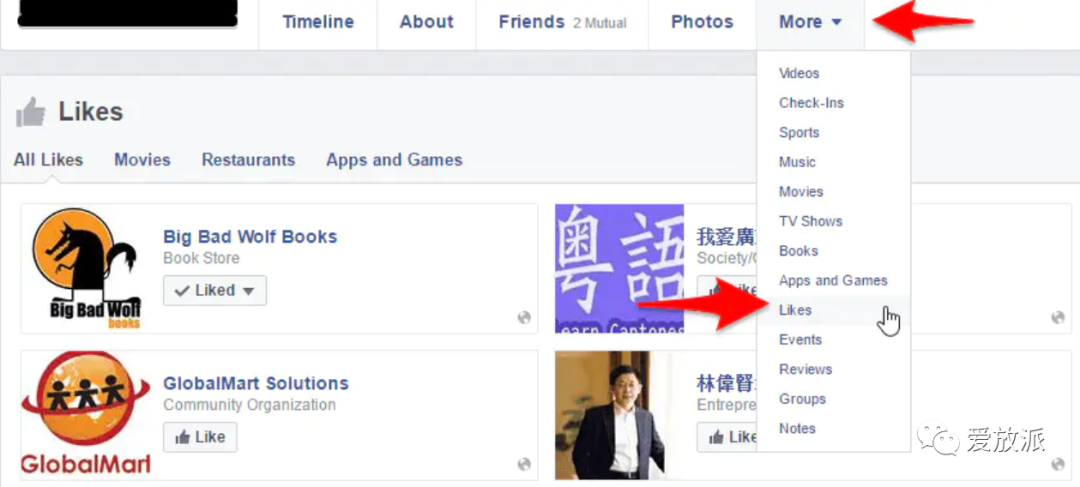
#4 and page likes from the page.
The method is very simple: find a home page and click Like. In most cases, Facebook will recommend a page like this after you like it, copy the page name, and check if it's available on the Audience Analytics section. And then? Check back for similar home pages like this one. This can be done endlessly until the recommended home page becomes irrelevant or you see the same recommendation over and over again.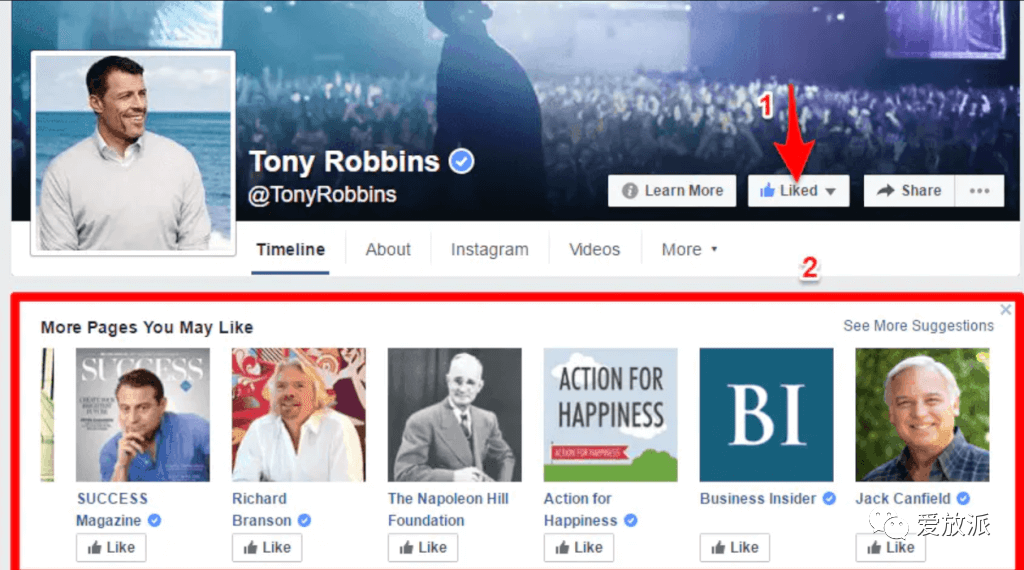
Also, the right side of the pull-down page has a "this home page likes" column, you can get more recommendations from it!
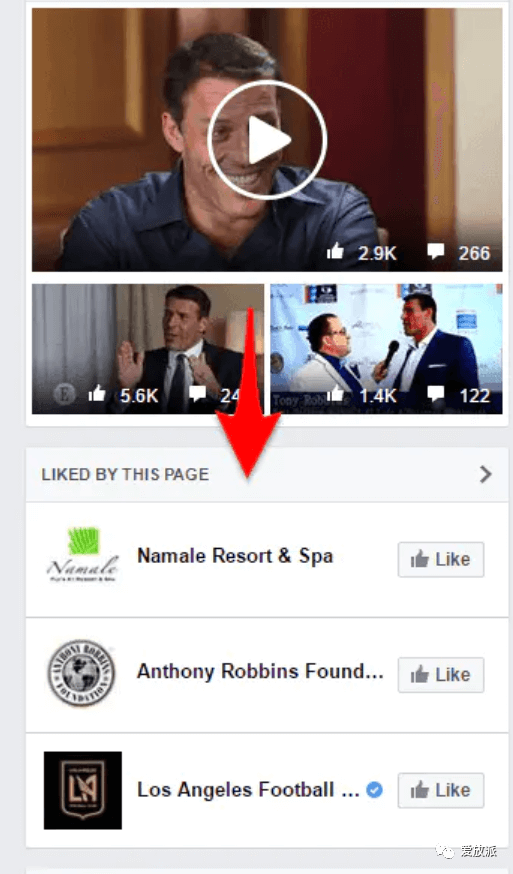
#6 the recommended options in your ad group settings.
Step 1: Open Ads Manager.
Step 2: Enter a word of interest and click on the "Recommendations" option.
As a reminder, if you're entering an interest term, facebook's suggested entries are often not Home words.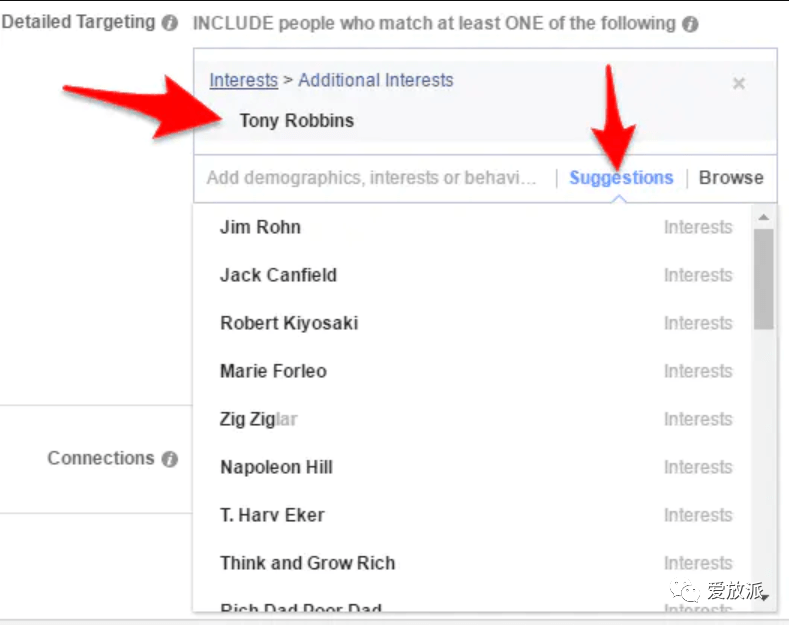
#7 create a Google campaign to see which sites visitors come from.
Glen Allsopp shared a great idea on Viperchill to create a Google campaign to see which sites visitors come from.
If you're doing a talk of ad marketing, it's going to work!
#8 use the Socail Bakers website.
It's also a share from Glen, who opened the Socail Bakers website to check out the home page of the fastest growing sports brand in a specified time and found that the home page "Spartan Race" was particularly special.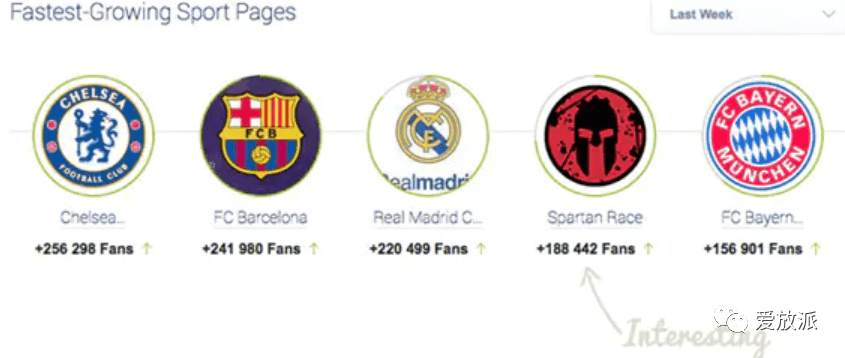
#9 use Facebook Gragh for inspiration.
Facebook Gragh was a popular tool a while ago, and I personally think audience analytics is better for people.
Use Facebook search bar to find interest words, pages, groups, and more., the action is to enter content such as: "pages liked by men who like FC Barcelona and Valencia CF" and then select the segmentation option on the left.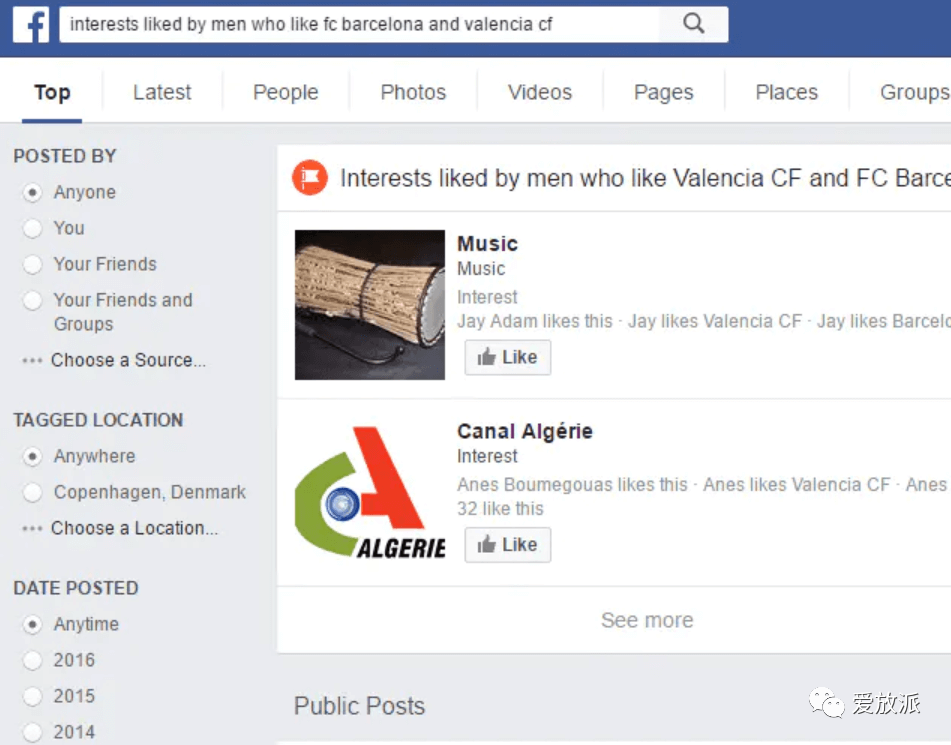
John Loomer and Social Media Examiner share some good examples.
#10 search for posts on Facebook.
Open this link: https://www.facebook.com/search/str/elizabethkbradley.com/stories-keyword/intersect. You can then replace "Elizabethkbradley.com" with your competitor or other URL name. The results of your search may include lookalike audiences that are interested in your competitors.
#11 search for Facebook posts on Google.
Search: site: facebook.com "TEACHABLE.COM." This is about the same as the 10th method, but I found that they will come out with different results.
#12 use Wikipedia.
Wikipedia has many potential words of interest. For example, I search for "Physics" (Ctrl-F) and jump to the "see-also" section. As the following illustration shows, the red box section contains hyperlinks to many potential interest words, especially those that seem useful for list of physicists and list of physics concepts.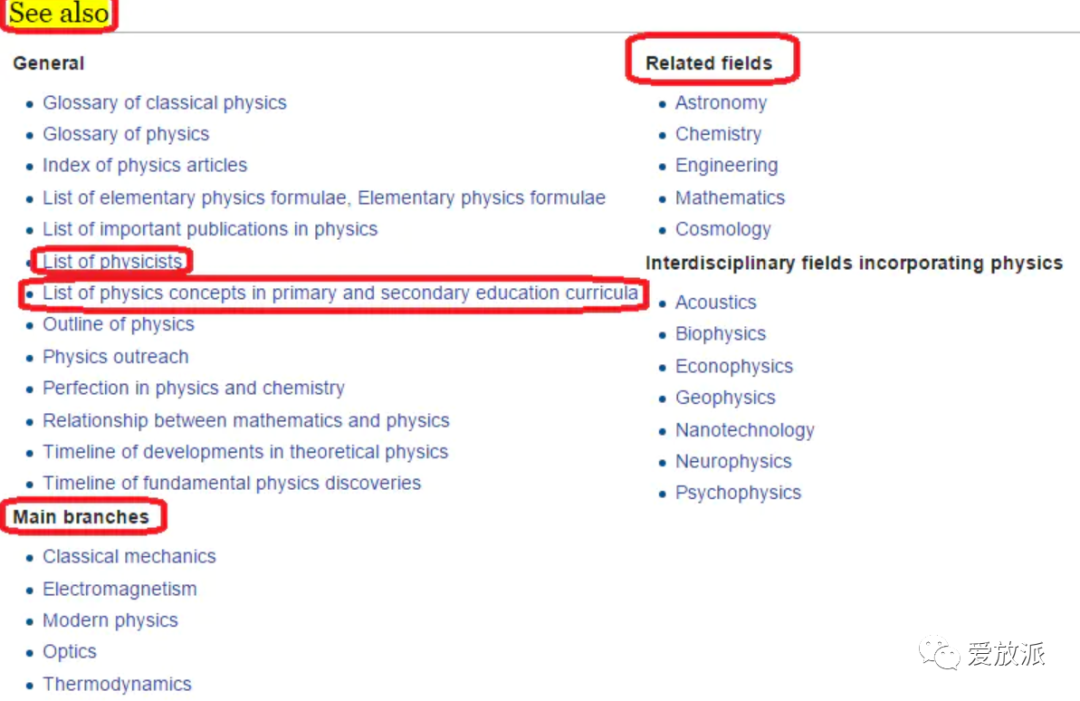
If you pull down to the bottom page, you'll see that the "branches of physics" section also has a lot to dig into. Note the show/hide button on the right, the main point open to see.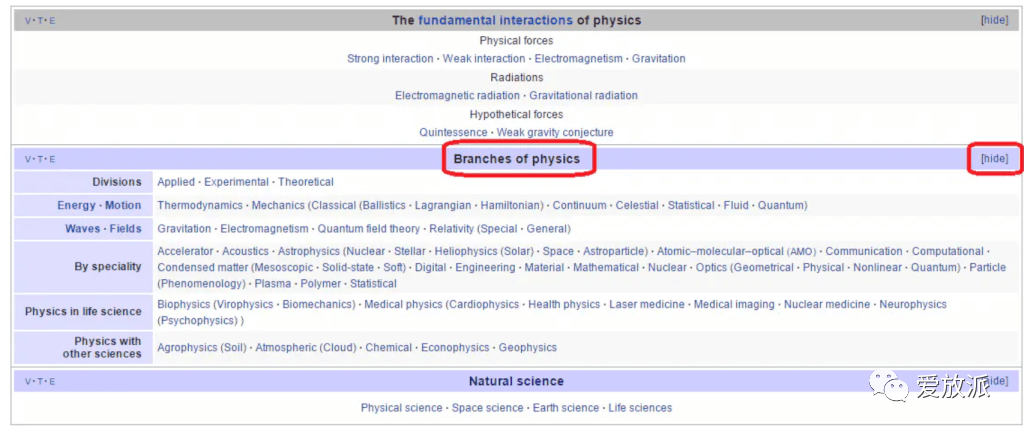
Above is just an example, but you can find that this can get a lot of term information, you can open one by one, each term has more than two sections, a constant stream of information, with ten years can not be used up!
#13 browse products on Amazon and IMDB.
While I was researching this article, I got a great idea from Mindvalley's Khai Yong: If you're looking for inspiration from an author or book, browse Amazon's website or visit a bookstore! If you're looking for computer or actor information, go to the IMDB website.
#14 Similarweb和Similarsites
At Similarweb, you can query the audience information for a particular site, and you can also query the source of the site before and after the audience visits. Take Amy Porterfield's website as an example: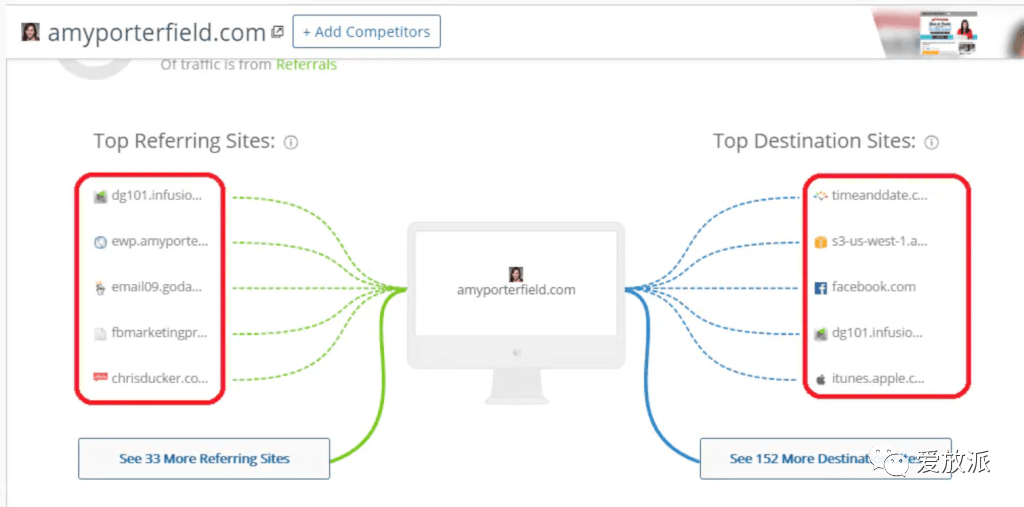
For Similarsites, again take Amy Porterfield's website as an example, as shown in the red box, there are several filters on the left, and I used related topic filters: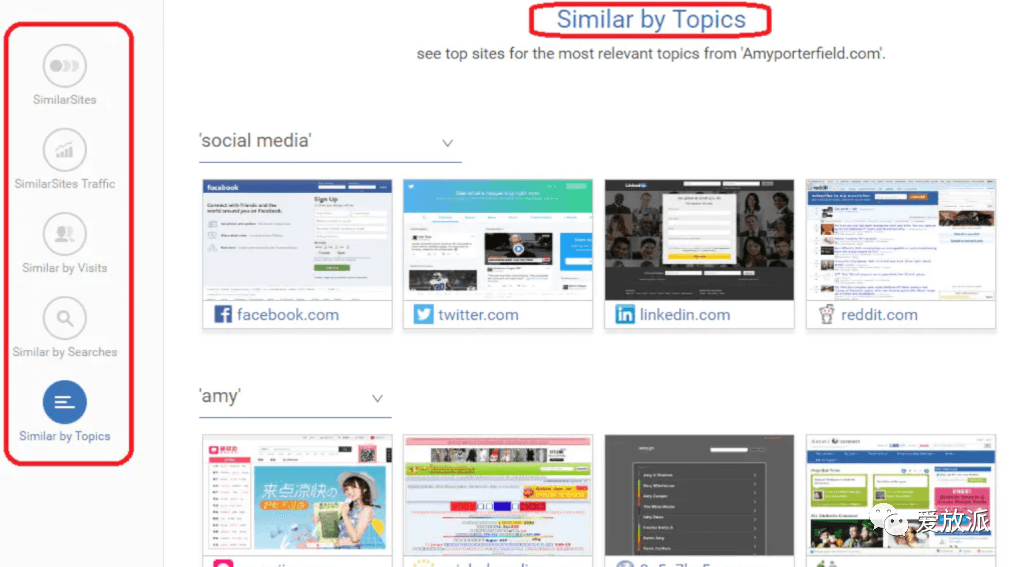
#15. Google Display Planner
Get information about the site from Google Display Planner, and then if you have an associated home page or related keywords.
Step 1: Open Google Display Planner.
Step 2: Select the path "find new targeting ideas" enter your information search click the tab "placements" and, if necessary, subdivide the site.
Click on "individual targeting ideas" and click on their URL to get the relevant statistics - of course, this is Google's data, and you can also find more information about the URL on Facebook's Audience Analytics.
#16 the "Why do I see this content" option.
Tammy Cannon and Claire Pelletreau explain how to know how you're targeted. After you see an ad, click on its pull-down option in the upper right corner: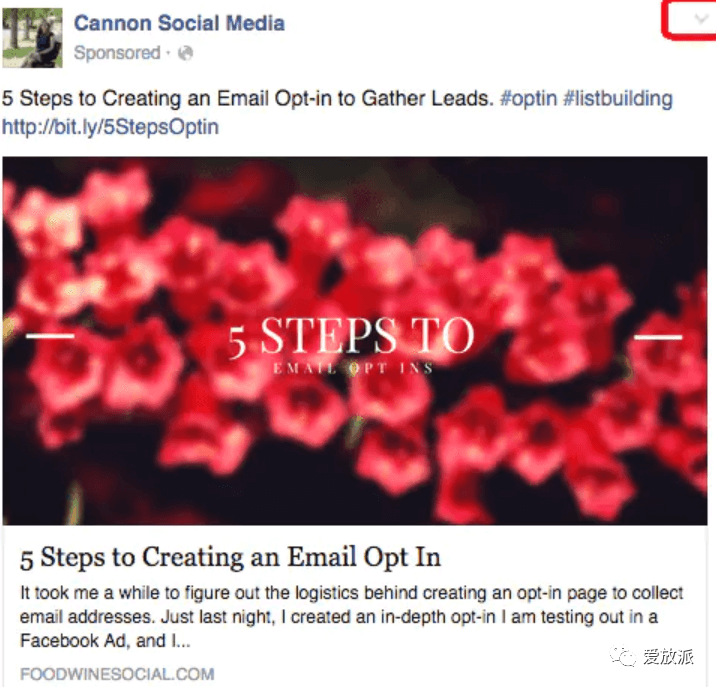
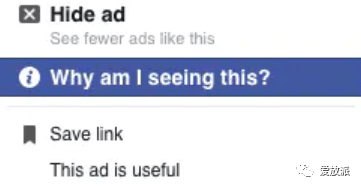
Click on the "Why do I see this" option and it's done! Then write down the relevant words directly.
6 Summary.
There are many ways to do a location survey, but I suggest you try only a few at a time and finally lock in the one that's best for you. Personally, I like to start with audience analysis because it produces results quickly, and then I often find more effective results outside of Facebook. These methods are popular and can help you quickly gather the information you need.
What's next?
After you find the words of interest, you have to use them correctly. You need to creatively combine these words of interest to reach the right audience. I'll show you how to use interest words correctly and if you're targeting group members, and the main issues I've identified in my research.
The second part.
1 5 ways to target your audience.
The easiest and most straightforward way to run a campaign is to choose the broad terms of interest mentioned earlier, which don't require much research. However, targeting only one of these words is often inaccurate.
#1 a wide range of words of interest.
When you set up an ad group, click "Browse" in the interest targeting area and some interest and behavioral words will pop up.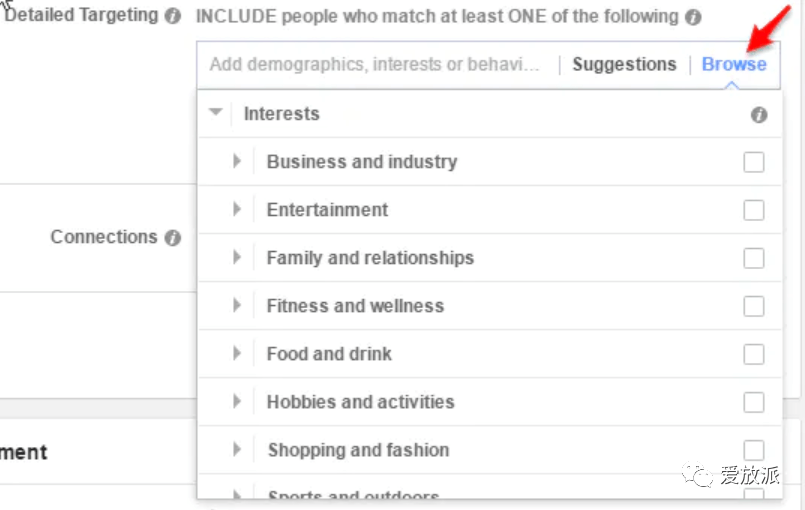
#2 home page.
As mentioned above, you can target specific home pages, which require some research. As far as I know, the more deeply you do your research, the more accurate your audience will be, the more interactive you will be, and the fewer ad competitors you'll have.
#3 layered keywords.
In the Interest Targeting Area, a wide range of words and interest associations can also be effective by layering down audiences by using the Include and Narrow Audience options. The Include option is typically used in the case of multiple words of interest, such as an audience interested in X or Y. The Narrow Audience option can target your audience more specifically, such as an audience interested in both X and Y.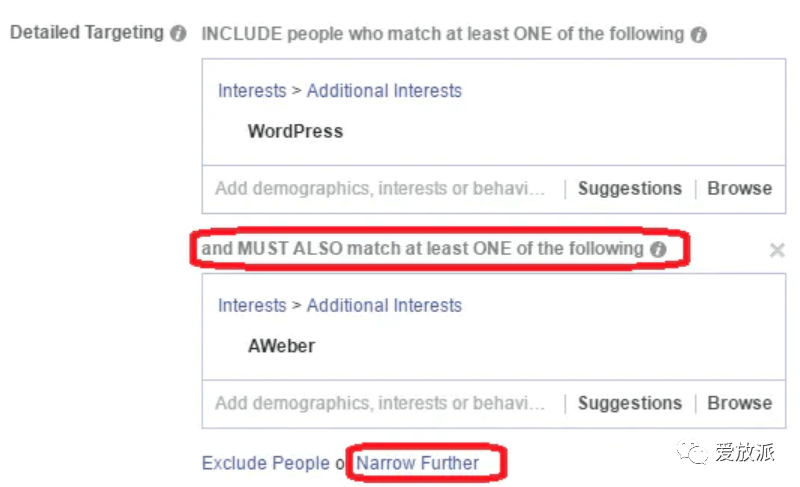
There's a big difference between the two targeting results, and it makes testing more difficult - you might have a 2x or 3x combination, each representing a different audience. I suggest you make a buyer user portrait, extract two or three of the most important angles from it, and then use different methods to achieve positioning.
For example, you want to locate a private health clinic. After the survey, you find that the target audience is interested in health-related topics, private sector topics of business development topics. So you've made the following positioning: be interested in everyday business tools like Entrepreneur Magazine and the Private Health Clinic Association and WorldPress. Does this cascade look practical?!
As we all know, Facebook's natural coverage has declined, and I've recently noticed a growing number of Facebook groups, almost everyone joining at least one group. With Facebook's launch of the group app, group composition is a great way to target an active audience. But the question is that there are no targeting options - perhaps there is another way to locate them.
#4 group targeting.
Attila, from lamattila.com, recently shared a great way to use the "narrow your audience" option I mentioned earlier. Very simple:
Step 1: Go to the group page, view the introduction, and pick out the relevant keywords (and tags).
Step 2: Set up the ad group, do the following positioning: at the same time on keywords 1 and keywords 2 and keywords 3... There is no limit to the number of keywords that match your findings. Obviously, the more cascades you do, the more accurate your audience will be.
The result is not just members of the group, but audiences interested in the group's content are likely to be targeted. The same applies to home pages with unavailable interests. Warm tips, later will also share how to find interest is not available on the home page Oh.
#5 use the Exclude Users option.
As the name implies, use the Exclude Users option to exclude an interest word from targeting your audience. For example, if you're in the fishing industry, you can target interest words like Outdoor Life magazine and exclude interest words such as hunters, runners, hikers, etc. that you don't want to target.
2 How big should the audience size be?
You've probably heard a lot of different answers to this question, and these answers are irrelevant because it all depends on your advertising strategy and advertising goals.
Personally, I like to target small audiences and run a lot of campaigns, which requires more effort, but often works better. Overall, I think the 100k audience size is more appropriate. Of course, if your audience size is 75k or 150k is no problem.
3 How do I tell the difference between an interest association word and a home page word?
There are a number of ways to do this, and while there is no guarantee that it will be 100% accurate, it is quite practical:
#1 compare audience size and Page fans in Audience Analytics.
Step 1: Open the Audience Analysis section.
Step 2: Enter the words of interest.
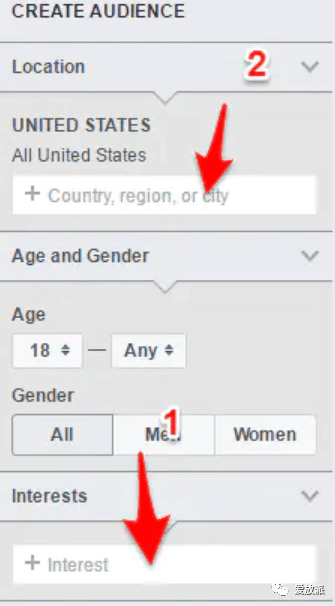
Step 3: Remove the country positioning and set additional options to the default (see figure below).
Step 4: Open a home page on a new tab.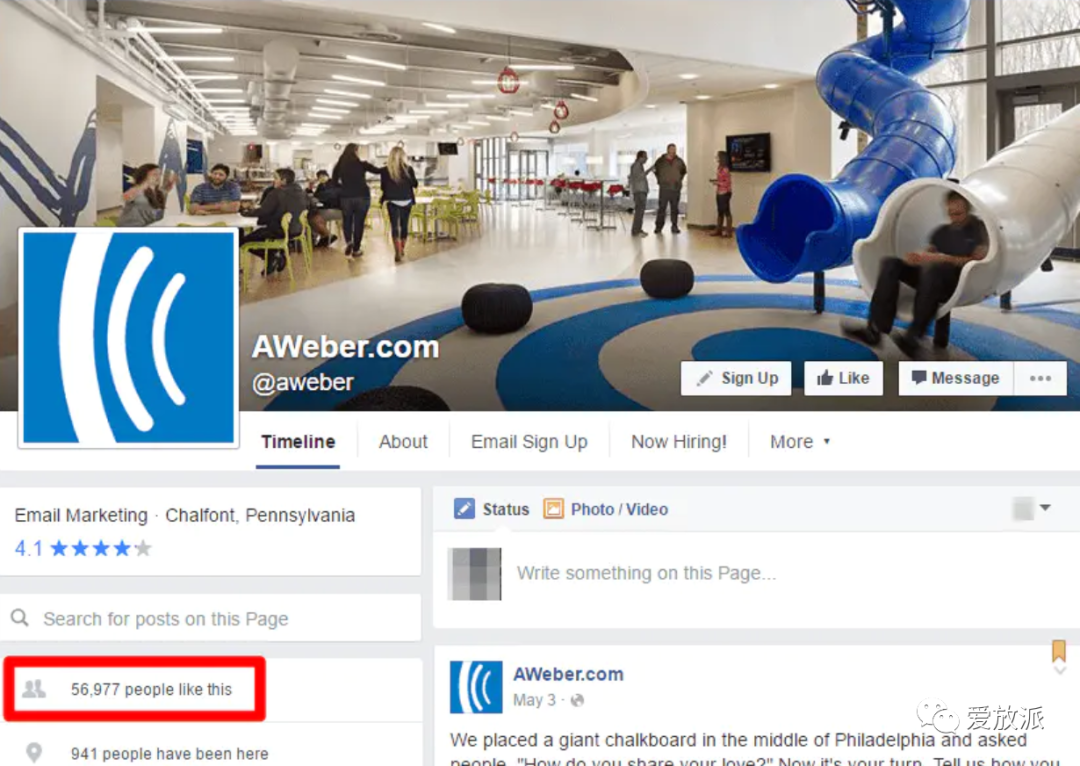
Step 5: Compare the number of Page fans with the number of "monthly active users" in audience analysis.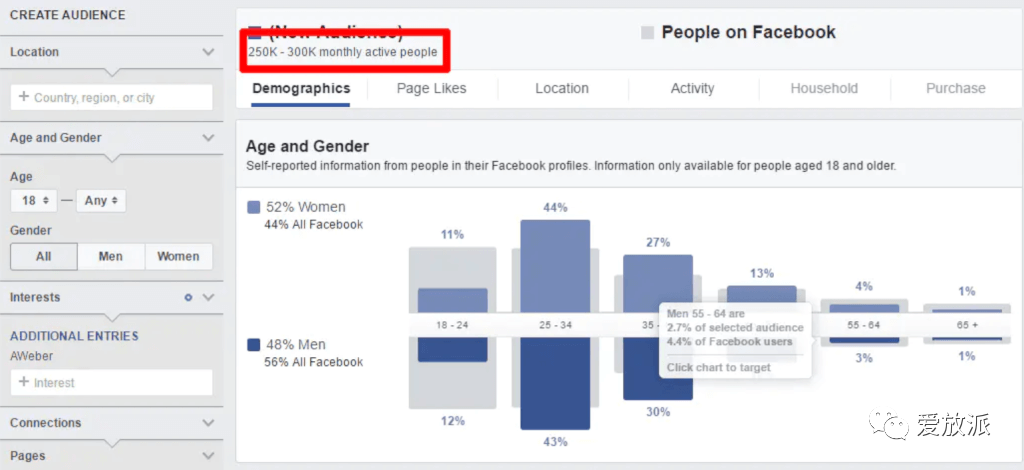
As in the example above, when you enter "AWeber" (only the word "Aweber" is available), the home page has 56,884 followers, but audience analysis shows 250k-300k monthly active users.
While likes and activities are two different things, the Aweber interest word in audience analysis is clearly not the AWeber home page interest word. This Aweber interest word may be made up of people who interact with the AWeber home page plus through interest association words. As I mentioned, this may not be accurate, but if the two numbers are too far apart, the interest word may be just an interest association word.
#2 pure words of interest (lowercase letters)
Compared to normally spelled words (capital letters), I find that keywords that are usually all lowercase are more likely to be an interest association word.
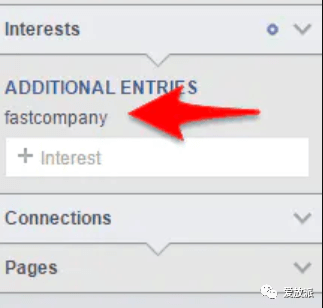
#3 official figures.
If you want to target things with official data (such as American teachers), suggest investigating the population of the United States and then comparing the size figures in your audience analysis. Is the latter bigger than the former? If so, this must be an interest association word.
#4 looks like a Wikipedia home page.
As mentioned earlier, if a topic suddenly attracts attention, Facebook automatically crawls the wiki to explain and generate a related information page. If you search for a home page that looks like the following image, it's just a buzzword, not a real home page.
#5 audience analysis.
Step 1: Open the Audience Analysis section.
Step 2: Enter a word of interest and locate the country, click the "Home Like" button (see figure below).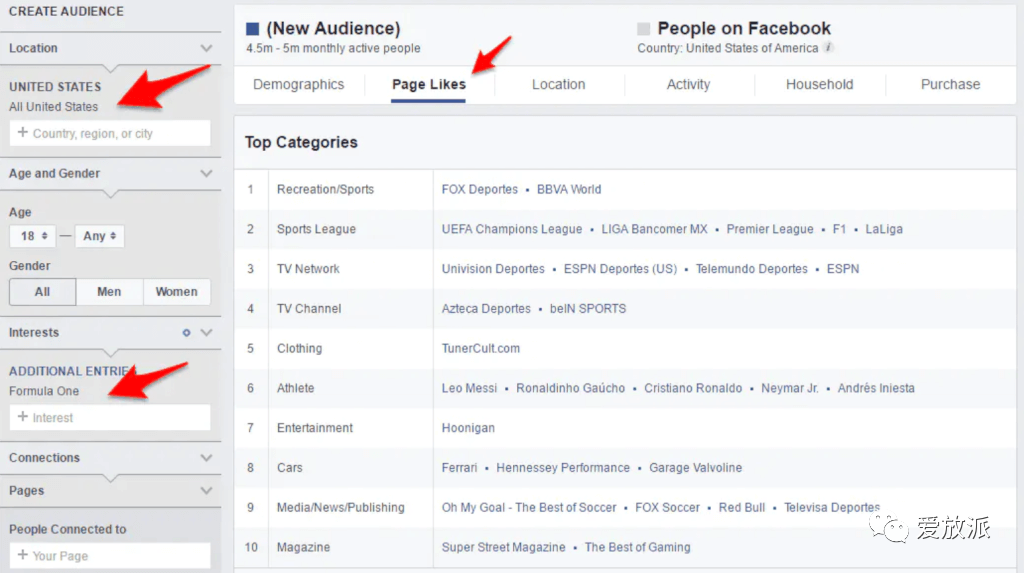
Step 3: Click on the "Likes" button on the right and sort in reverse order.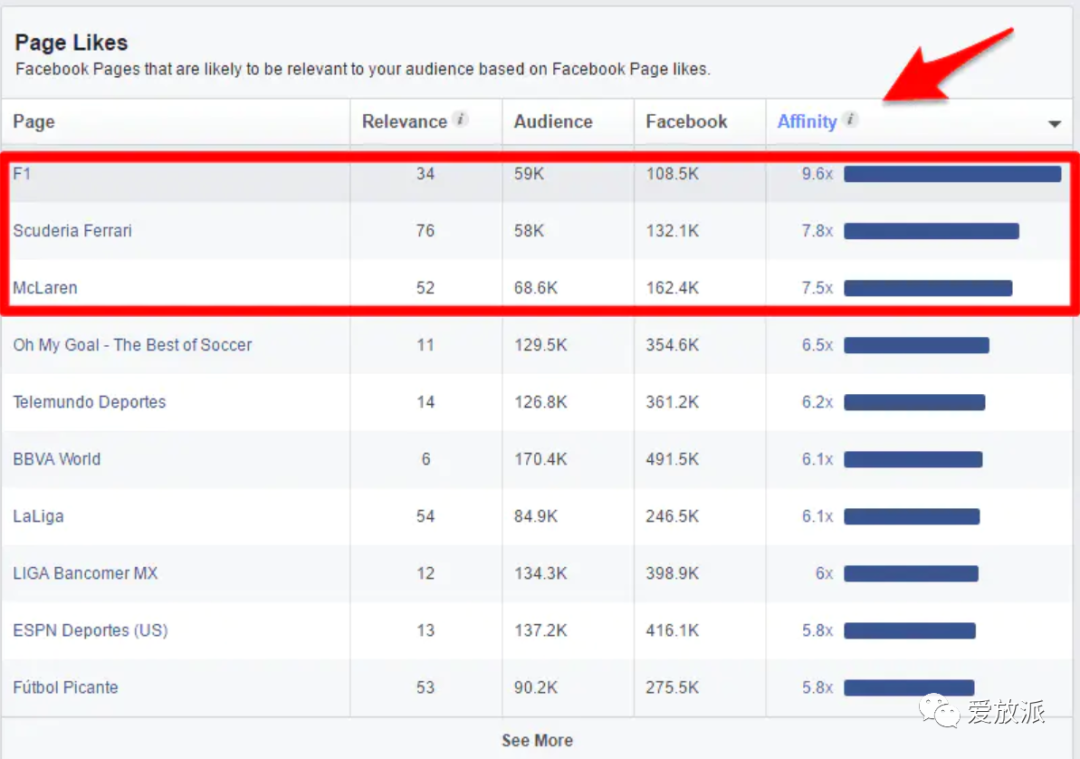
If your likes are low (10x or less) and your Page clearly falls into a different topic category (and the interests you're typing), that means it's a wide audience, which is ultimately an interest term. In the image above, for the interest word "Formula One", after sorting by likes, only the first three are related to Formula One and motorsport, and the others are related to football. If this "Formula One" interest word is a home page, you should see a lot of motorsport-related home pages at the top of the list.
4 Find tips for interests that are not available on the home page.
Remember when I said I had a way to find an interest that wasn't available on the home page? It's a time-consuming approach that you might not adopt at all, but I'd better write it.
The idea is to focus on a topic and then try a variety of keywords. For example, click on the company type of one page to find another page of the same type.
I once found a home page with an unavailable interest through a company's previous name (later renamed), which I found on the history page of the company's website. This may be that virtually all interests are not available on the home page and are simply incorrectly marked.
So it takes patience and creativity, and if you find one, your ROI will be great because there are fewer advertising competitors.
5 Summary and summary.
In some ways, doing surveys is annoying and time-consuming, but I find that doing surveys directly affects my advertising performance. I see it as a deal where the more you budget and the less research you can do, after all, you can draw conclusions from the amount of advertising money you get. By the same toe, the less you budget and the more you need to do to investigate, the more you can spend your money on the left edge.
Overview
- Make a user portrait and you need to know who you're talking to (WHO)
- On Facebook, it's all about audience targeting (HOW)
- The above 2 points do well and bad, will have a great impact on the performance of advertising.
- Targeting surveys are really time-consuming, but the more you invest, the better your ads will be.
- Remember to target only those people who are really interested in your topic and interact positively.
Common vocabulary for individual industry audiences - for informational purposes only.
1. Tool class.
Interests:
Drill, Wrench, Hand tool, Carpentry, Screwdriver, Home Hardware, Power tool,Multi-tool
Home Improvement,Artisan,Handicraft,House painter and decorator,Woodcraft,Sculpture,Do it yourself (DIY),Gardening
2. Hairdring products.
Interests:
Online shopping
Hair care,Hairstyle,Hair products
3. Cleaning/Home Class.
Interests:
Cleaner,Cleaning,Cleanliness,Detergent,Disinfectant,Homemaking,Housekeeping
Online shopping malls,shopping mall,Supermarket
Kitchen,Kitchen utensil,Kitchenware,Cooking,
Homemaking,Household goods,Housekeeping,Home Appliances,Home improvement
4. Sports products.
Interests: Adidas, Nike, Inc., Shoes, Sportswear (activewear), Men's clothing
Health club, Jogging, Running club, Bodybuilding, Running
Fitness and wellness
5. Health care.
Interests: Health & wellness, Massage, Relaxation technique
6. Beauty category.
Interests: Facial care, Personal care, Skin care, Beauty salons, Cosmetics
7. Toys.
Interests: Educational toy, Hot Toys, Radio-controlled car, Toys "R" Us, Toys
Child, Child development, Early childhood, Children's clothing
8. Mobile phone accessories products.
Interests:Charger, IPhone, Mobile device, Mobile phone accessories, Mobile phones, Smartphones
9. Bag class.
Interests:Fashion accessories, Shopping and fashion,Handbags
Backpack, Backpacking (travel), Bag, Hand luggage
10. Travel outdoors.
Interests: Business travel, Mountaineering, Outdoors, Tours, Tourism, Travel, Camping
11. Measurement class.
Hardware store, Household hardware, Measurement, Interior design, Home improvement
Source: original link: https://adespresso.com/blog/guide-facebook-ads-interest-targeting-research-easy-advanced-methods-exposed/
Author: Aske Christiansen, digital marketing blogger. Compilation: Fay Content Finishing: Love To Play Live Tutorials.

Website:
Resource download site: ifunpi.com.
Navigation learning station: facebookzhongguo.com.
Tutorial blog content site: facebookjiaocheng.com.
TikTokAds tutorial: tiktokads.com.cn.
Social media:
Public Number: Love Pai (ID: ifunpi)
YouTube subscription: Love to play live tutorials.
Bilibili Subscription: Love To Play Live Tutorials.
Know the column: Facebook live tutorial.
Community:
Love to send live tutorials.QQGroup 1: (Full.)
Love to send live tutorials.QQGroup 2: 486658713.
WeChat Group:(Join us)
COD WeChat Group:(Join us)
Tik Tok WeChat Group:(Join us)
More articles.👇👇👇
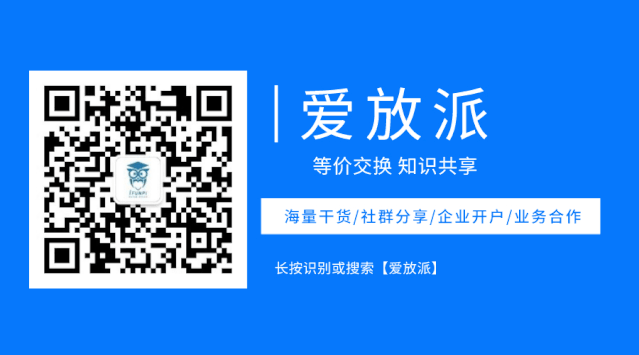


Go to "Discovery" - "Take a look" browse "Friends are watching"